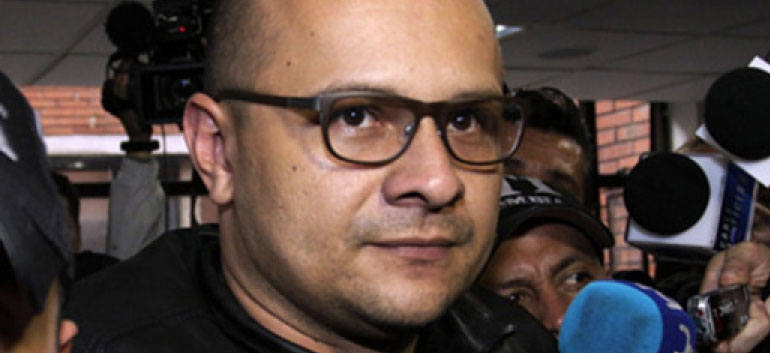Colombian Senator Armando Benedetti broke new ground in the deepening peace talks hacker scandal Thursday morning, sharing previously undisclosed information from what he claims to be the “diary” of the chief suspect.
In a lengthy interview with Caracol Radio early Thursday, Senator Benedetti, a member of President Juan Manuel Santos’ ruling U Party (Partido de la U) coalition, revealed that he has gained access to copies of a record-keeping notebook alleged hacker Andres Sepulveda used to document political targets and the actions he took to discredit them and invade their privacy.
“It’s a sort of database, filled with all sorts of damaging information,” he said.
Arrested by police in May and currently awaiting a number of charges related to illegal wiretapping and possibly espionage, Sepulveda is accused of conducting a political dirty war on behalf of the right-wing Democratic Center (Centro Democratico) party and attempting to sabotage ongoing peace talks between the Colombian government and the FARC rebel group, the country’s largest.
As his alleged diary appears to indicate, Sepulveda was closely monitoring the online activity of various political figures deemed enemies by the campaign of presidential runnerup and current Democratic Center Director Oscar Ivan Zuluaga, which hired Sepulveda, ostensibly as a “social media contractor.”
Sepulveda, moreover, is believed to have bought information from the military’s covert “Andromeda” intelligence program, revealed earlier this year to have been monitoring the communications of opposition politicians, journalists, and government delegates to the Colombian peace talks.
Zuluaga and the Democratic Center party in general have been stuanch opponents of the government’s ongoing FARC negotiations.
“Mr. Oscar Ivan Zuluaga, or his campaign, contracted [Sepulveda] to search out illegal or ‘Andromeda’ information so that [Zuluaga] could retain power, end the peace process, and win the elections,” said Benedetti. “That’s where Oscar Ivan Zuluaga has hurt himself, to put it that way, and has penal responsibility.”
Benedetti claims there is “extremely clear” evidence showing who Sepulveda worked with in the military and who he was targetting for hacking.
From what Benedetti reveals during the interview, the notebook would appear to confirm earlier reports that the Zuluaga campaign went after Francisco Santos, a cousin of President Juan Manuel Santos, whose email was also hacked by the Andromeda program, and Zuluaga’s chief adversary during the party nomination process.
“What’s more, I have the names of certain people and even journalists who [the people involved in the scandal] believed to be ‘Chavistas’ and infiltrators in the country. [The hackers] had their emails,” said Benedetti.
The accusation brings to mind the DAS wiretapping scandal, in which the government of former President Alvaro Uribe, the founder of the Democratic Center party and one of its current senators, was found to be spying on human rights workers, journalists, opposition politicians, and other individuals deemed subversive by the administration. “Chavista” is a term often used by Uribe and Democratic Center supporters to connote leftists supposedly being manipulated by communist ideology from Venezuela.
Both Zuluaga and Uribe have repeatedly denied any direct connection to or knowledge of Sepulveda’s activities, calling Sepulveda an “infiltrator” sent by President Juan Manuel Santos to sabotage the Zuluaga campaign. Prior to be hired by Zuluaga, Sepulveda had worked on Santos’ successful 2010 presidential campaign.
Benedetti did not specificy how or from whom he obtained the supposed diary, which he said contains more than 50 pages, but he did claim that it had been vetted by “analysts” who confirmed its authenticity and submitted to the relevant authorities.
According to the senator, certain parts were written out in the form of a receipt, “to be shown to someone” and compensated accordingly.
“The problem isn’t with the person who obtained the information,” said Benedetti, “but rather the person who asked him to.”
Sources
- Senador Benedetti presenta presunto diario del hacker (Caracol Radio)


